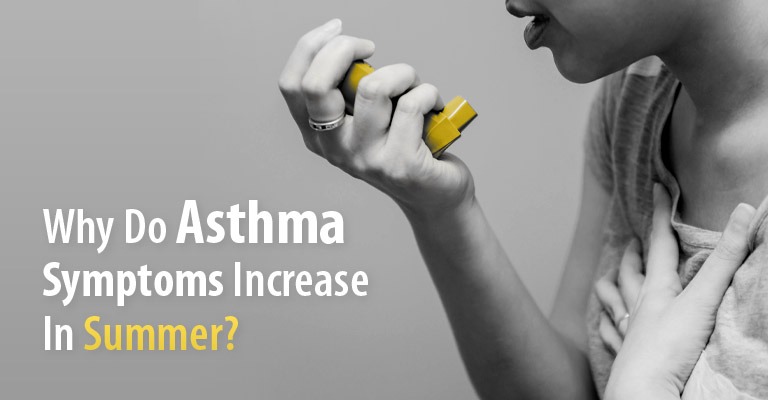Asthma is a condition more often than not associated with the cold season. However, hot summer weather can trigger asthma symptoms as well. Two plausible causes could be: Breathing in hot air resulting in narrowing of the airways leading to shortness of breath, cough and wheezing, or very high levels of pollutants, pollens and greenhouse gases in the air when the temperatures are soaring, which can be particularly challenging in case someone has allergic asthma.
What are the factors causing summertime asthma?
The season-specific risk factors for summertime asthma are:
# High temperatures: Extreme heat can affect airways and trigger symptoms. Dehydration also makes it worse.
# High humidity: Humid air is heavy and hence, harder to breathe. It also traps irritants like pollen, mold and dust mites, which are asthma triggers.
# Ozone: A product of sunlight and atmospheric chemicals, ozone can affect lung function and worsen asthma attacks during summers.
# Summer allergens: In case of allergic asthma triggered by allergens more prevalent in hot weather, summer months could usher in asthma attacks.
# Smoke: Smoke carries small particulate matter that could be particularly harmful for asthma patients.
What are the known symptoms of summertime asthma?
# Frequent coughing
# Shortness of breath
# Fatigue
# Common cold
# Wheezing
# Pain in the chest
# Allergies
# Trouble sleeping
How is summertime asthma treated?
If the trigger is a known allergen, you can try to avoid it to the extent possible. When that’s not happening, your doctor might augment your prescription with:
# Oral antihistamines: These medicines prevent narrowing of the airways and production of mucus by changing the immune system’s overreaction to allergens.
# Nasal decongestant sprays: These provide short-term relief for summertime nasal symptoms, but one must guard against overuse.
# Saline irrigation: This procedure uses salt water to rinse nasal cavities and flush out pollens and other allergens.
# Nasal steroid sprays: These OTC nasal sprays are very effective in relieving symptoms and are quite safe.
Tips to keep asthma at bay during summers
# Stay informed: Keep a check on the weather and local area air quality forecast and don’t let the heat stump you. Be informed before stepping out in the sun.
# Keep reliever handy: Keep your asthma reliever close at hand since symptoms might appear anytime, more so in searing heat.
# Act wise: Limit your outdoor activities and exercises if the weather is oppressively hot and always keep your asthma medication cool.
# Stay cool: It’s extremely important to keep your body cool in extreme heat by seeking refuge under a shade or indoors whenever possible, or by going for a swim.
# Have an action plan ready: It’s important to know early warning signs of a flare-up and have a checklist of steps to take immediately. Your doctor can guide you on this.
# Stay hydrated: This is a no-brainer. Drink lots of water to stay well hydrated, particularly when out in the hot sun.
# Start early: You can plan an early start for your outdoor activities or exercise regimen, to avoid the hottest part of the day.
# Don’t stop your medication: If you stop or cut down on your medication, you might experience an exacerbation of asthma symptoms.
In spite of all the precautions you may take, asthma symptoms may flare up suddenly owing to certain unavoidable triggers, and it may even require emergency care. At MNBC, our emergency specialists are equipped to handle all kinds of medical emergencies related to respiratory distress and our Pulmonologists are on call 24×7.



